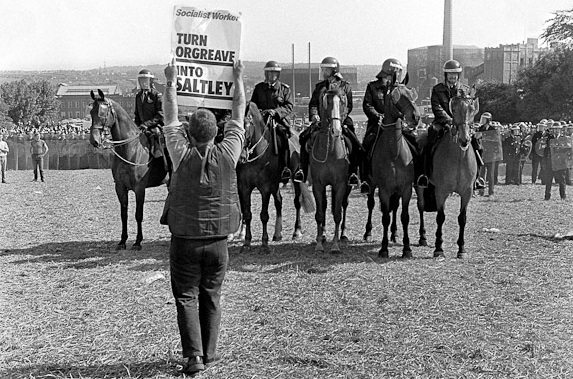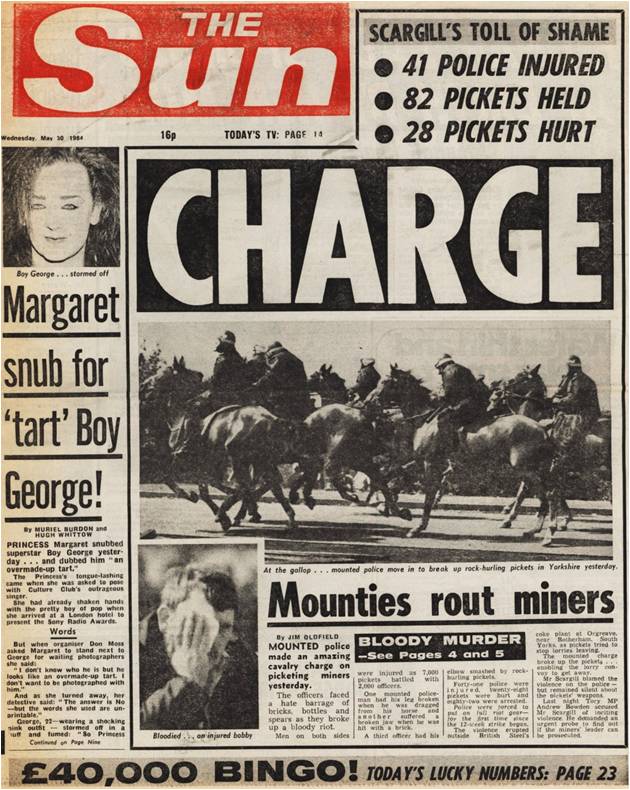
Pic by Martin Shakeshaft, from his Strike84 collection
Orgreave campaigners call for inquiry into ‘smear campaign’
A delegation of former Orgreave miners and campaigners will meet this afternoon with the new home secretary calling for an inquiry into a ‘smear campaign’ to expedite politically motivated prosecutions in 1984. (Additional reporting by Jon Robins.)
The Orgreave Truth and Justice Campaign, who have long campaigned for a public inquiry, have submitted a legal case against the home office based on the new evidence alleging that 95 miners were wrongfully arrested and that the police, the government and a complicit media deliberately falsified the narrative against them. They meet Amber Rudd this afternoon.
The Battle of Orgreave, a coking plant near Rotherham in South Yorkshire, saw a mass picket by the National Union of Mineworkers met with a 5,000-strong military-style police force. The force included officers on horseback and units with short shields and truncheons.
The miners allege that the police brutally attacked them without justifiable provocation, and that the attack felt pre-planned. Then Prime Minister, Margaret Thatcher, who was determined to defeat the strike made it clear she supported the police. This was, she famously said, ‘mob rule’ by the miners.
You can read Mark George QC on the Battle of Orgreave on the Justice Gap here
 The Orgreave campaign presented a legal submission to Theresa May when she was home secretary last December. ‘The previous Home Secretary and the current Home Secretary have had ample time to read through and consider our legal submission. A response was expected by March this year,’ said the Orgreave Truth and Justice Campaign secretary Barbara Jackson. ‘We are therefore hopeful that an inquiry decision is imminent.’
The Orgreave campaign presented a legal submission to Theresa May when she was home secretary last December. ‘The previous Home Secretary and the current Home Secretary have had ample time to read through and consider our legal submission. A response was expected by March this year,’ said the Orgreave Truth and Justice Campaign secretary Barbara Jackson. ‘We are therefore hopeful that an inquiry decision is imminent.’
‘I promised the families the full truth about Hillsborough. I don’t believe we will have that until we have the full truth about Orgreave,’ Andy Burnham, the shadow home secretary, said in the Commons in April 2016. He claimed that the South Yorkshire Police ‘used the same underhand tactics against its own people in the aftermath of the miners’ strike that it would later use with such deadly effect against the people of Liverpool’.
Henrietta Hill QC represented 22 Hillsborough families and is one of the co-authors of a submission for an inquiry into Orgreave. ‘The Hillsborough inquest was hugely significant for the Orgreave campaign,’ the barrister told the Justice Gap. ‘There is potential for a direct link between the two events. It was the same police force only several years apart and there are many compelling parallels between Hillsborough and Orgreave. The fact is that even after all these years accountability, justice and truth can be delivered.’
‘The model that was used prior to the Inquest – the Hillsborough Independent Panel – is something that the campaigners are interested in,’ said Hill. As a result of the work of the panel – chaired by the bishop of Liverpool, James Jones and with unrestricted access to £450,000 – the families applied to the High Court for the verdicts in the original inquests to be quashed.
One obvious parallel between the two events is concerns over collusion in the gathering of statements by the police. ‘It became clear during the trial back in the 1980s that officers had parts of their accounts dictated to them,’ said Hill. ‘They were given a standard scene-setting paragraph. Officers were putting things into their statements that they couldn’t have seen.’
Another parallel is the way the press reported the events. ‘After Hillsborough the media were used by the police to push a narrative that blamed the fans. In Orgreave it was said that the media was used by the police to push an anti-miner narrative,’ said Hill.
 The new evidence as reported on the Guardian over the weekend, brought to light during the Hillsborough inquest, includes minutes of a meeting held at Downing Street attended by Margaret Thatcher, then Home Secretary Leon Brittan and Attorney General Sir Michael Havers. Minutes rcord the group inviting the home secretary to ‘pursue vigorously all possible means of accelerating the prosecution of alleged offences arising from the dispute’. A second document shows that Brittan promised ‘he would seek to persuade them [the police] to increase the rate of prosecutions and to give priority to the most serious cases’.
The new evidence as reported on the Guardian over the weekend, brought to light during the Hillsborough inquest, includes minutes of a meeting held at Downing Street attended by Margaret Thatcher, then Home Secretary Leon Brittan and Attorney General Sir Michael Havers. Minutes rcord the group inviting the home secretary to ‘pursue vigorously all possible means of accelerating the prosecution of alleged offences arising from the dispute’. A second document shows that Brittan promised ‘he would seek to persuade them [the police] to increase the rate of prosecutions and to give priority to the most serious cases’.
Further documents reveal Brittan telling the group that ‘the more serious cases’ were being expedited and that ‘it would be helpful if greater publicity could be given to sentences imposed by courts, particularly the more severe ones’.
A letter signed by 40 MPs and peers has been sent to the Home Secretary calling for the establishment of an inquiry without delay. The letter, endorsed by shadow Home Secretary Andy Burnham and Green Party Co-Leader Caroline Lucas, says that ‘former miners, their families and communities have waited long enough for the truth. It is now incumbent on us all to make sure it is finally established.’
10 reasons for an inquiry
From the Orgreave Truth and Justice Campaign (here)
- The incredibly serious and unprecedented nature of what happened at Orgreave: Orgreave involved a massive police operation that resulted in countless pickets being seriously injured, falsely arrested and wrongly prosecuted. Nothing on this scale had ever been seen before.
- The militarised nature of the police tactics on that day: Orgreave involved officers from all over the country being organised in military fashion, and following a new secret police Manual which permitted the use of force to ‘incapacitate’
- The deliberate construction of a false narrative in officers’ evidence: Many of the junior officers at Orgreave had parts of their witness statements dictated to them by senior officers, and gave evidence about things that they simply could not have seen. This was an orchestrated attempt to conceal the truth by the police.
- The deliberate promotion of that false narrative through the media: The media coverage of events of Orgreave was grossly distorted, to present the miners as the instigators of the violence when the police’s own recording and amateur footage showed the reverse to be true. This shaped the public consciousness for years and made it very hard for the truth about what happened to emerge.
- The lack of legal accountability for what happened at Orgreave: No police officer faced criminal or disciplinary charges for what happened at Orgreave or the calculated cover up that took place afterwards. South Yorkshire Police agreed to pay civil damages to 39 of the miners, without any admission of liability. There was no public inquiry into how and why the trials collapsed. The contemporaneous legal system therefore failed to deliver any truth, justice or accountability to the Orgreave miners.
- The ongoing consequences of Orgreave: The effects of Orgreave have been lasting. Many miners continue to suffer with physical and psychiatric injuries as a result of what happened at Orgreave. Many lost their jobs and marriages. A fundamental distrust in the police has been engendered in former mining communities, which has continued through the generations.
- The role of Hillsborough and Pitchford: Both Orgreave in 1984 and Hillsborough in 1989 involve South Yorkshire police apparently colluding in their accounts and with the media to promote a false “truth” to the outside world. We believe that if the police lies after Orgreave had been addressed properly, the Hillsborough cover up might not have been allowed to happen.
The Pitchford Inquiry has recognised the need to examine the role of undercover police in the miners’ strike, so it is important that the role of overt and aggressive policing of the sort that happened at Orgreave is looked at too. - New sources of evidence – officers coming forward, the Cabinet Papers and the IPCC report: Officers present at Orgreave have begun to break ranks and tell the truth about the process by which they had had parts of their statements dictated to them.
The Cabinet Papers from 1984/5 have now been released, and they raise serious questions about the role of central government in the policing of the strike and the prosecutions of the pickets.
Although the IPCC decided not to investigate further in June 2015 much of the evidence it unearthed supports what the OTJC has been saying. - The key issues seen at Orgreave still relevant today: We still see inappropriate kettling, excessive force, mass arrests, collusion with the media and police overcharging after demonstrations.
Concerns remain about the ability of police to “confer” when recording their accounts after serious incidents.
The police continue to use the media to promote their own narrative of events in contentious cases. - The law requires there to be an inquiry: There is an overwhelming case for a public inquiry under s.1 of the Inquiries Act 2005, because Orgreave is an event that has caused “public concern”.
Article 3 of the European Convention of Human Rights strengthens the case for an inquiry because what the pickets were subjected to at Orgreave amounts to “inhuman and degrading treatment”.






